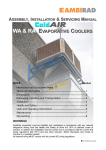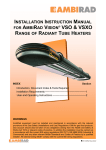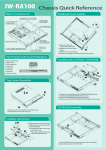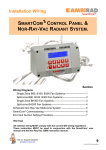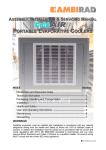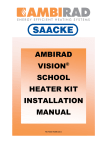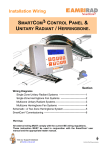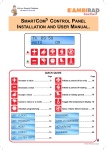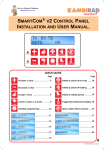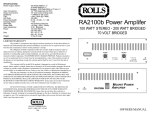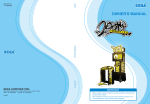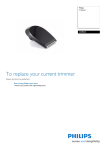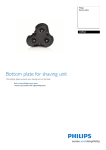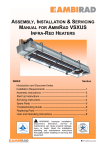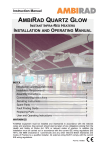Download ColdAIR OandM Installation Manual Jan 2015
Transcript
Instruction Manual ASSEMBLY, INSTALLATION & SERVICING MANUAL WA & RA EVAPORATIVE COOLERS INDEX Section Introduction and Document Index Technical Information ----------------------------------------------------- 1 Dimensions ------------------------------------------------------------------ 2 Packaging, Handling and Transportation ---------------------------- 3 Installation -------------------------------------------------------------------- 4 Health and Safety ---------------------------------------------------------- 5 User and Operating Instructions --------------------------------------- 6 Maintenance ----------------------------------------------------------------- 7 Dismantling ------------------------------------------------------------------ 8 WARNINGS AmbiRad equipment must be installed and maintained in accordance with any relevant obligations arising from the Health and Safety at Work Act 1974 or relevant codes of practice. In addition the installation must be carried out in accordance with the current IEE wiring regulations (BS 7671) and any other relevant British Standards and Codes of Practice by a qualified installer. All external wiring MUST comply with the current IEE wiring regulations. Part No. 703500 Document Index. GENERAL INFORMATION ............................................................................................................................... 4 User Information ............................................................................................................................................. 4 SECTION 1 – TECHNICAL INFORMATION ..................................................................................................... 4 1.1 Machine identification data ....................................................................................................................... 4 1.2 Introduction ............................................................................................................................................... 4 1.3 Technical information ............................................................................................................................... 5 1.4 Warnings .................................................................................................................................................. 6 1.5 Control Panels .......................................................................................................................................... 6 1.6 Improper use ............................................................................................................................................ 6 SECTION 2 – DIMENSIONS ............................................................................................................................. 7 2.1 RA100 ....................................................................................................................................................... 7 2.2 RA200 ....................................................................................................................................................... 7 2.3 RC100 ...................................................................................................................................................... 8 2.4 RC200 ...................................................................................................................................................... 8 2.5 WA100/150 ............................................................................................................................................... 9 SECTION 3 – PACKAGING, HANDLING AND TRANSPORTATION ............................................................. 9 3.1 Delivery of the unit .................................................................................................................................... 9 3.2 Handling and transportation ..................................................................................................................... 9 3.3 Lifting ...................................................................................................................................................... 10 3.3.1 Lifting with fork lift ........................................................................................................................... 12 3.3.2 Lifting with cables............................................................................................................................ 12 3.4 Unpacking the equipment ....................................................................................................................... 10 3.5 Storage ................................................................................................................................................... 10 SECTION 4 – INSTALLATION ........................................................................................................................ 11 4.1 General Warnings WA evaporative cooling units ................................................................................... 11 4.2 Positioning and Installation of the WA evaporative cooling units ........................................................... 11 4.2.1 Wall installation ............................................................................................................................... 11 4.2.2 Window installation ......................................................................................................................... 11 4.3 General Warnings RA/RC evaporative cooling units ............................................................................. 12 4.4 Positioning and Installation of the RA/RC evaporative cooling units ..................................................... 12 4.4.1 RA roof installation .......................................................................................................................... 12 4.4.2 RC roof installation.......................................................................................................................... 14 4.4.3 RC wall window installation ............................................................................................................ 15 4.4.4 RA wall window installation............................................................................................................. 15 4.5 Installation .............................................................................................................................................. 16 4.6 Connection to the power supply ............................................................................................................. 16 4.7 Wiring diagrams...................................................................................................................................... 17 4.7.1 Control panel with Temperature probe ........................................................................................... 17 4.7.2 Schematic wiring RA150 ................................................................................................................. 18 4.7.3 Schematic wiring RA200 ................................................................................................................. 18 4.7.4 Schematic wiring RC100 ................................................................................................................ 19 4.7.5 Schematic wiring RC200 ................................................................................................................ 20 4.7.6 Multiple coolers ............................................................................................................................... 21 4.7.7 Multiple coolers via Router ............................................................................................................. 22 4.7.8 Multiple coolers via two Routers ..................................................................................................... 23 4.8 Connection to the water supply .............................................................................................................. 24 SECTION 5 – HEALTH AND SAFETY ........................................................................................................... 24 5.1 Protection devices .................................................................................................................................. 24 5.2 Clothing .................................................................................................................................................. 24 5.3 Residual risks ......................................................................................................................................... 24 5.4 Emergency situations ............................................................................................................................. 24 2 SECTION 6 – USER INSTRUCTIONS ............................................................................................................ 25 6.1 General ................................................................................................................................................... 25 6.2 First start-up ........................................................................................................................................... 25 6.3 Remote Command Unit .......................................................................................................................... 26 6.3.1 Command and signal descriptions.................................................................................................. 26 6.3.1.1 Command descriptions ......................................................................................................... 26 6.3.1.2 Signal descriptions ................................................................................................................ 27 6.4 Switching on ........................................................................................................................................... 27 6.5 Switching off ........................................................................................................................................... 27 6.6 Starting mode ......................................................................................................................................... 27 6.6.1 Manual start up ............................................................................................................................... 27 6.6.2 Automatic start up ........................................................................................................................... 27 6.7 Settings ................................................................................................................................................... 27 6.7.1 Setting current time ......................................................................................................................... 27 6.7.2 Setting ON / OFF periods ............................................................................................................... 28 6.7.3 Reading a restored program ........................................................................................................... 28 6.7.4 Modifying a programme .................................................................................................................. 28 6.7.5 Deleting a stored programme ......................................................................................................... 28 6.7.6 Changing the Temperature and Humidity values ........................................................................... 28 6.7.7 Locking/unlocking remote control unit ............................................................................................ 29 6.8 Operating Mode ...................................................................................................................................... 29 6.8.1 Cooling ............................................................................................................................................ 29 6.8.2 Ventilation ....................................................................................................................................... 29 6.9 Operating Faults ..................................................................................................................................... 30 6.10 Bus system ........................................................................................................................................... 30 SECTION 7 – MAINTENANCE ....................................................................................................................... 30 7.1 End-of-Season Maintenance .................................................................................................................. 30 7.2 Pre-Season Maintenance ....................................................................................................................... 30 7.3 Maintenance Safety Regulations............................................................................................................ 31 7.3.1 Clothing ........................................................................................................................................... 31 7.3.2 Unit warnings .................................................................................................................................. 32 7.3.3 Residual risks.................................................................................................................................. 32 7.3.4 Unit warnings .................................................................................................................................. 32 7.4 Technical assistance requests ............................................................................................................... 32 SECTION 8 – DISMANTLING ......................................................................................................................... 32 8.1 Disposal .................................................................................................................................................. 32 3 General Information User Information The contents of this document are for information purposes only and are subject to modifications without notice; This manual is to be considered an integral part of the machine and must be filed in an accessible place for the workers that use and maintain the machine. This manual must be kept in the project file until final machine dismantling and if the machine is sold, it must be passed to the new owner. The workers using and maintaining the machine must be fully aware of its contents before the machine is placed in service. If the manual is misplaced or damaged, immediately request a copy by contacting Technical Assistance Service at AmbiRad Limited, indicating the identification data of the plant shown on the machine identification plate and on the cover of this manual. If a fault occurs causing machine stoppage, AmbiRad Limited is not liable in any way for any damages caused by the stoppage and in no way is the warranty period extended. The machine is conforming to the following European Community Directives: 2006/42/EEC Machinery Directive 2006/95/EEC Low Voltage Directive 2004/108/EEC EMC Directive UNDER NO CIRCUMSTANCES MAKE MODIFICATIONS TO THE MACHINE AND ITS INTENDED USE. AmbiRad Limited declines all responsibility for any damages which may be, directly or indirectly, caused to exposed persons or property, due to improper use or use of the machine for different purposes other than the design purposes, incorrect installation, inappropriate power supply, different or changes to the installation environment from the one declared during order confirmation, grave deficiency of maintenance, unauthorized alterations and modifications, use of non-original spare parts, removal of the protection guards, ignoring the instructions for use, negligence, etc. 1. Technical Information. 1.1 Machine identification data 1.2 Introduction area with frequent changes of fresh, filtered and possibly cool air. For large areas such as industrial buildings, an air conditioning plant is not practicable due to the large volume of air to be cooled and the thermal loads of processes to be neutralized, requiring very high energy load, plus the cooling effect is reduced by the exhaust air extraction plant and frequent opening of doors during normal activity. During the summer to improve the internal environment within a production unit, warehouse or other area, it is necessary to ventilate the Evaporative cooling plants that cool the air using a natural principle represent an optimal solution: air passes through special wet water filters, Machine identification data is shown on the warranty sheet supplied to the customer and is enclosed in the documentation and on the machine identification plate. 4 losing part of its heat during the evaporation process of the water and hence lowering the air temperature. The absence of refrigeration plant reduces energy consumption to a minimum and enables large volumes of air to be treated. 1.3 Technical Data WA 100 WA 150 kW 10000 7500 5000 15 13000 9700 6500 19 V 230V – 50Hz 230V – 50Hz Unit Maximum Average Minimum Air Capacity 3 m /h Cooling Capacity (1) Power Voltage Current amps 3.7 4.8 Power Consumption kW 0.9 1.2 Water Consumption (average)* l/h 34 39 Water Inlet Ø in 3/8 3/8 Water Outlet Ø mm 60 60 Air Duct Size mm 600 x 600 600 x 600 m 5+1 bend 5+1 bend Maximum Duct Length Humidification Panel: Thickness Surface Area Saturation Efficiency Dimensions : L x W X H mm m² % mm Weight (empty - full) Noise Data Outdoor (2) Indoor Air Capacity Maximum Average Minimum Cooling Capacity (1) 100 100 2 2 88% 88% 1300 x 670 x 1300 1300 x 670 x 1300 kg dB A 60 - 75 Min/Max speed 49 / 65 49 / 66 63 - 78 Min/Max speed 50 / 66 50 / 67 H L Unit RC 100 RA 150 RA 200 RC 200 3 10000 7500 5000 13000 9700 6500 20000 15000 10000 25000 18750 12500 m /h kW 15 19 30 36 V 400V - 50Hz (3pha) 230V - 50Hz 230V - 50Hz 400V - 50Hz (3pha) amps 3.5 4.8 7.0 7.0 Power Consumption kW 1.6 1.2 1.8 3.2 Water Consumption (avg)* l/h 34 43 64 64 Water Inlet Ø in 3/8 3/8 3/8 3/8 Power Voltage Current Water Outlet Ø mm 60 60 60 60 Air Duct Size mm 600 x 600 600 x 600 600 x 1150 850 x 470 Static Pressure pa 80 n/a n/a 80 Maximum Duct Length m See graph page 5 5+1 bend 5+1 bend See graph page 5 Humidification Panel: Thickness Surface Area Saturation Efficiency mm m² % 100 2.7 88% 100 2.7 88% 100 3.4 88% 100 3.4 88% Dimensions : LxWXH Weight (empty - full) Noise Data Outdoor (2) Indoor (1) (2) mm 1150 x 1150x 1050 1150 x 1150x 1050 1650 x 1150x 1050 1650 x 1150x 1050 kg dBA 87 - 108 67 - 88 120 - 146 160 - 186 Min/Max speed 55 / 61 56 / 62 Min/Max speed 50 / 66 50 / 67 Min/Max speed 53 / 68 53 / 70 Min/Max speed 58 / 65 60 / 66 test conditions: E. Temp. = 33°C-R. Hum 60% open field test, 4m distance 5 W RC100 Fan Curve RC200 Fan Curve 1.4 Warnings and possibly cool air, such as: • Factories, production areas • Commercial premises • Warehouses The ColdAIR evaporative cooler can be installed in all areas where it is necessary to improve the internal environment where the area must be ventilated with frequent changes of fresh, filtered The equipment must NOT be used for anything other than its designed use for any reason whatsoever or used in a different way than stated in this manual. DO NOT install the machine in closed areas; the machine must be installed outside the area to be treated, except by specific approval of the manufacturer. Do NOT start-up the machine if it is not connected to the relative plant ( duct ) of air distribution. When the plant is operating, do not touch the fan – Mechanical danger. Under NO circumstance should any work be undertaken on moving parts. 1.5 Control Panels Any Controllers supplied by AmbiRad are manufactured according to EN 60204/1 regulations. UNDER NO CIRCUMSTANCE MAKE MODIFICATIONS TO THE CONTROL PANEL. UNDER NO CIRCUMSTANCE USE WATER TO PUT OUT FIRES 1.6 Improper Use The unit cannot be used for purposes other than those stated in paragraph 1.4 of this instruction manual. UNDER NO CIRCUMSTANCE INSTALL COLD AIR EVAPORATIVE COOLING PLANTS IN POTENTIALLY EXPLOSIVE ENVIRONMENTS. 6 2. Dimensions. 2.1 RA150 Section C - C A: Water Inlet B: Water Outlet (drain) C: Wiring Connections 2.2 RA200 Section A - A 7 A: Water Inlet B: Water Outlet (drain) C: Wiring Connections 2.3 RC100 Section A - A A: Water Inlet B: Water Outlet (drain) C: Wiring Connections 2.4 RC200 Section A - A 8 A: Water Inlet B: Water Outlet (drain) C: Wiring Connections 2.5 WA100/150 A: Water Inlet B: Water Outlet (drain) C: Wiring Connections 3. Packaging, Handling and Transportation. 3.1 Delivery of the unit When the unit is delivered, the customer MUST check the condition of the goods Check the packaging and its contents, if damage due to transportation is found, record the damage on the shipping documents to be signed by the shipping agent and send a copy by fax to AmbiRad Limited 3.2 Handling and transportation Take care when handling Evaporative Cooling units. During off loading, handle and position to avoid damage to the equipment. Avoid contact with elements, which may damage the equipment. AmbiRad Limited declines any responsibility for damage caused during transportation, loading and off loading of the evaporative cooling units. 9 3.3 Lifting 3.3.1 Lifting with fork lift damaging the bottom of the machine. Widen the forks as much as possible to balance the load. Dip the ends of the forks to avoid 3.3.2 Lifting with cables We suggest to attach the cables as shown, inserting spacers of an adequate length to prevent the cables from damaging the casing when tightened. Because of the heavy weight, RC models, when unpacked, are provided with punched brackets to allow to lift them by using appropriate metal tubes. Place goods down with care. Avoiding dropping and sudden movements. UNDER NO CIRCUMSTANCE remain under suspended loads and inside the movement area of the lifting equipment. Make sure that the capacity of the lifting equipment is adequate for the weight of the machine. Lifting must only be carried out by qualified personnel. 3.4 Unpacking the equipment Leave the equipment on its transportation packaging base with any protection guards mounted, so that the lower part is raised from the floor to avoid damage, until the unit is installed. Free all the components from the packaging material and collect the packaging to avoid potential danger of fire and suffocation of persons or animals. Disposal of packaging materials must conform to the regulations in force in the country of destination where the evaporative cooling unit is installed 3.5 Storage During transportation and storage, make sure that the environmental temperature is between 10 and 50 °C. If the ColdAIR evaporative cooling unit must be stored, make sure that the relative humidity in the warehouse is between 5% and 90%. 10 4. Installation WA Units. 4.1 General Warnings about installing WA units. wall until it makes contact with the rear mountings of the bracket Before proceeding to install, make sure that each evaporative cooling unit has been unpacked and checked for damage. Fix the cooling unit using the appropriate side brackets and the self tapping screws provided. Positioning and installation of the evaporative cooling units must be carried out by qualified personnel and by observing the laws in force in the country of destination. 4.2.2 Window installation Fix the window bridge to the window after the hole for the air duct has been made. Refer to dimensional sketch below. 4.2 Positioning and Installation of WA Series evaporative cooling units. Fix the supplied support bracket at the prepared frame. 4.2.1 Wall installation On the rear side of the cooling unit (fan side), prepare the first section of air duct (box section 600 x 600mm) Fix the support bracket to the wall after the hole for the air duct has been made. Refer to dimensional sketch below. On the rear side of the cooling unit (fan side), prepare the first section of air duct (box section 600 x 600mm) Position the cooling unit onto the support bracket, pushing the cooling unit towards the wall until it makes contact with the rear mountings of the bracket Position the cooling unit onto the support bracket, pushing the cooling unit towards the Fix the cooling unit using the appropriate side brackets and the self tapping screws provided. 11 WALL INSTALLATION WINDOW INSTALLATION WINDOW INSTALLATION. SUPPORT BRACKET NOT SUPPLIED WITH THE UNIT TO BE MADE BY THE CUSTOMER WALL INSTALLATION. SUPPORT BRACKET SUPPLIED WITH UNIT Installation RA/RC Units. 4.3 General Warnings about installing RA/RC units Before proceeding to install, make sure that each evaporative cooling unit has been unpacked and checked for damage. Positioning and installation of the evaporative cooling units must be carried out by qualified personnel and by observing the laws in force in the country of destination. 4.4 Positioning and Installation of RA/ RC series evaporative cooling units. It is recommended to apply silicone sealant between the two flanges to guarantee a perfect water tight seal. 4.4.1 Roof mounted RA Evaporative coolers. Prepare and secure the air inlet duct onto the roof structure. (The unit is equipped with a mating duct flange for direct attachment). DUCT DIMENSIONS: RA 150 = 600 X 600mm RA 200 = 600 X 1150mm Position the base of the cooling unit onto the duct flange using fixings provided. 12 Ensure all strips are seated correctly in their grooves. Check that the clamp holding the flexible hose to the pump is tight. Position and secure the four posts to each corner of the cooling unit base using the screws provided. Insert the water distributor into the grooves of the humidification panels ensuring the supports of the water distributor are in a uniform manner on the strips. Noting the position of the water pump in the unit, make a hole through the panel for the hose end fitting. Position and secure the humidification panels by sliding them between the guides of each side post. Ensure the groove, on one side of the panel, is uppermost. Secure the fitting with a hose clamp and complete the water connections to the pump. Insert the grilles onto the sides of the panels using clips provided Insert the water distribution strips into the grooves on each panel. 13 Once all four protection grilles have been secured, locate and fix the top of the unit using the screws provided. Note: DO NOT ASSEMBLE THE GRILLE AT THE FRONT OF THE MACHINE (CONNECTIONS / COMPONENTS SIDE). The grille can be inserted later without clips to aid maintenance. Insert the clips downwards to their first positive stop. Once all the clips are in position, push fully home until they are level with the top of the panels. 4.4.2 Roof mounted RC Evaporative coolers Prepare and fix an air inlet flanged duct and a frame to hold up the unit. The flange has to be of the same dimension of the unit’s trunk duct flange. The unit is equipped with a section of flanged duct that will be fixed to the flange of the inlet duct already prepared and with two side bars that will be fixed to the prepared frame. Verify that the frame is designed to support the weight of the machine, doesn’t cause vibrations and is perfectly horizontal. It may be necessary to insert anti-vibration dampers between frame and the bars, this needs to be planned before manufacturing the frame and consider fitting flexible couplings in the water connections. 14 Position the evaporative cooler on the inlet duct. Position the evaporative cooler on the inlet duct. Fix the two flanges (base duct flange-inlet duct flange) together and the bars at the frame by using provided bolts. Fix the two flanges (base duct flange-inlet duct flange) together and the bars at the frame by using provided bolts. We recommend fitting an outlet flexible connection between the two flanges to avoid vibrations transmitted through the ducts. We would suggest to insert an outlet flexible connection between the two flanges to avoid vibrations transmitted through the ducts. We recommend applying silicone sealant between flanges to guarantee perfect insulation from external agents. 4.4.4 Wall/Window evaporative coolers 4.4.3 Wall/Window evaporative coolers Prepare and fix an air inlet flanged duct and a frame to hold up the unit. mounted RC mounted RA Prepare and fix an air inlet flanged duct and a frame to hold up the unit. The flange has to be of the same dimension of the unit’s trunk duct flange. The flange has to be of the same dimension of the unit’s trunk duct flange. The unit is equipped with a trunk of flanged duct that will be fixed to the flange of the inlet duct already prepared and with two side bars that will be fixed on the frame. The unit is equipped with a trunk of flanged duct that will be fixed to the flange of the inlet duct already prepared and with two side bars that will be fixed on the frame. Verify that the frame is designed to support the weight of the machine, doesn’t cause vibrations and is perfectly horizontal. Verify that the frame is designed to support the weight of the machine, doesn’t cause vibrations and is perfectly horizontal. It may be necessary to insert anti-vibration dampers between frame and bars, this needs to be planned before manufacturing the frame and consider fitting flexible couplings in the water connections. Position the evaporative cooler to the inlet duct. Fix the two flanges (base duct flange-inlet duct flange) together by using bolts provided. 15 4.5 Installation Inside the building, prepare the first fixings points for the support chains of the air inlet duct. These must be placed in a position to avoid excessive force on the air inlet duct and make sure they are on the same axis as the machine. To support the unit from the ceiling or the wall, use chains and accessories having the necessary test certificates, made from zinc -plated steel or stainless steel and having a wire diameter of no less than 3 mm or dimensioned for the weight to be supported, bear in mind safety margins imposed by regulations. We recommend applying silicone sealant between flanges to guarantee perfect insulation from external agents. DO NOT USE ALUMINIUM ALLOY OR SIMILAR COMPONENTS Once the plant has been installed, rotate the diffuser blades towards the exterior and adjust the blades to an optimal position to direct the airflow. 4.6 Connection to the power supply Connection to the power supply must be carried out by qualified personnel. All components used to connect the power supply must be certified. Before working on the power supply cables, make sure that power is cut-off. Provide an efficient earth connection . The power supply is: 230 V ~ 50 Hz must be placed in a position that can be easily reached. Each cooling unit must be connected to the power supply using a two pole switch. The isolator must have a distance between its contacts of at least 3 mm for each pole and The electrical installation must be in accordance to the current I.E.E. Regulations. 16 The cooling unit is supplied • An Electrical board and Main power inlet switch for connection, near to the unit. • A Control panel with display for remote command of the equipment, positioned inside the building. be covered. (*WA/RA units **RC units) with: A multi-core cable with 5 cores, for connection of the remote control panel to the cooling unit. Make the connection using shielded cable type 20 AWG - 5 core with a minimum section of 0.5mm² - Maximum length of 25 meters. It is essential to maintain the polarity of the electrical phases and the numbers on the wires/terminals. A multi-core cable made of 2* or 4** core + earth, for connection to the power supply: Make the necessary cable extensions using cables of adequate sections depending on the distance to Connections are made as shown on the wiring diagram below. 4.7 Wiring Diagrams 4.7.1 Control Panel with Temperature Probe • screened cable as shown in the diagram below, connect the ’screen’ of the cable to the earth. Connect the cooling unit to the power supply using the 2*/4** pole isolator switch. (*WA/RA units **RC units) Connect the Remote Control Panel to the Cooling Unit using a 5 core • CONTROL PANEL brown white green yellow grey yel/grn brown brown brown blue COOLER TERMINAL CONNECTIONS m /s grey yellow Screened cable 5 x 0.5mm² green white brown brown brown L3 L2 brown 1 blue yellow/green Note: grey cable used for optional BMS control. 17 Power supply WA/RA 230V~50Hz RC 400V~50Hz 230V~50Hz 4.7.2 Schematic wiring for WA100 and RA150 FUSE brown blue yellow/green L N A3 V- L2 L1 V+ M1 M M Y1 S1 M4 I II III m V- L2 L1 V+ s / red blue black white A1 6 5 4 3 2 1 FUSE 1314 grey yellow green white brown 10 9 8 7 blue brown 1211 A1 A2 A3 M1 M4 S1 S2 Y1 V+ L1 L2 V- ms / A2 S2 Legend Main Switch PCB Control Panel Fan Pump Drain Float switch Inlet Valve 230V~50Hz 4.7.3 Schematic wiring for RA200 FUSE brown blue yellow/green L N A3 M1 M4 M2 M M Y1 V- L2 L1 V+ M S1 I II III I II III m V- L2 L1 V+ s / red blue black white A1 6 5 4 3 2 1 FUSE 1314 A2 S2 V+ L1 L2 V- ms / 18 grey yellow green white brown 10 9 8 7 blue brown 1211 A1 A2 A3 M1 M2 M4 S1 S2 Y1 Legend Main Switch PCB Control Panel Fan 1 Fan 2 Pump Drain Float switch Inlet Valve yellow/green blue brown grey black N L3 L2 L1 FUSE FUSE FUSE M1 V- L2 L1 V+ A3 415V/3P~50Hz 4.7.4 Schematic wiring for RC100 M 6 5 4 L1 L2 L3 3 2 1 L1 L2 L3 m V- L2 L1 V+ s / KM1 A1 KM2 T1 T2 T3 T1 T2 T3 M Y1 S1 KM1 KM2 M4 I 10 9 8 7 2 1 6 5 4 3 grey yellow green white brown blue brown 1211 II III FUSE 1314 V+ L1 L2 V- ms / A2 S2 A1 A2 A3 KM1 KM2 19 Legend Main Switch M1 PCB M4 Control Panel S1 1st Speed contactor S2 2nd Speed contactor Y1 Fan 1 Pump Drain Float switch Inlet Valve yellow/green blue brown grey black FUSE FUSE FUSE M2 V- L2 L1 V+ A3 N L3 L2 L1 415V/3P~50Hz 4.7.5 Schematic wiring for RC200 M1 M 6 5 4 L1 L2 L3 M 3 2 1 L1 L2 L3 6 5 4 L1 L2 L3 3 2 1 L1 L2 L3 m V- L2 L1 V+ s / KM1 A1 KM2 T1 T2 T3 T1 T2 T3 M Y1 S1 KM1 KM2 M4 I 10 9 8 7 2 1 6 5 4 3 grey yellow green white brown blue brown 1211 II III FUSE 1314 V+ L1 L2 V- ms / A2 S2 A1 A2 A3 KM1 KM2 20 Legend Main Switch M1 PCB M2 Control Panel M4 1st Speed contactor S1 2nd Speed contactor S2 Y1 Fan 1 Fan 2 Pump Drain Float switch Inlet Valve The system comprises of: • 1 Control panel display unit. • 1 ColdAIR evaporative cooler acting as a master. • Up to a max of 3 routers each having a max of 4 ColdAIR evaporative coolers as slaves. 4.7.6 Multiple Coolers Multiple ColdAIR evaporative coolers can be connected into one system via a single control panel and one or more router modules. When designing the system, the siting of the evaporative coolers and control panel must be carefully considered, as the sensor is built into the controller. Max distance between router and the coolers is 200m. System examples shown below. 1 Router (max 5 coolers) 2 Routers (max 9 coolers) 3 Routers (max 13 coolers) 21 230V ~ 50Hz L N 22 MASTER COOLER TERMINAL CONNECTIONS m V- L2 L1 V+ /s L1 L2 L1 L2 max.200m V- L2 L1 V+ DISPLAY MODULE L1 L2 L1 L2 ROUTER L1 L2 L1 L2 max.200m 1 2 V- V+ SLAVE COOLER TERMINAL CONNECTIONS m V- L2 L1 V+ /s m V- L2 L1 V+ /s SLAVE COOLER TERMINAL CONNECTIONS max.200m SLAVE COOLER TERMINAL CONNECTIONS m V- L2 L1 V+ /s m V- L2 L1 V+ /s SLAVE COOLER TERMINAL CONNECTIONS All coolers and routers must be connected to 230V mains supply. *Interconnecting between Display Module and Router must be used using screened cable. SLAVE COOLER(S): Connect terminals L1 and L2 to the router outlet terminals L1 and L2. Add a jumper cable between terminals M/S and V-. Maximum cable run between router and cooler(s) is 200m. MASTER COOLER: Connect terminals L1 and L2 to the router input terminals L1 and L2. Do not use V+ and V-. Maximum cable run between router and cooler is 200m. DISPLAY MODULE: Connect terminals L1, L2, V+ and V- to router input terminals L1, L2, V+ and V- using 4 x 0.5mm² screened cable. Maximum cable run between display module and router is 200m. NOTES 4.7.7 Multiple coolers via Single Router Diagram for use with Display Module model ref SCP015V110 only. Please consult supplier for display module ref SCRE10A/SCRE50D 230V ~ 50Hz L N 23 L1 L2 L1 L2 MASTER COOLER TERMINAL CONNECTIONS / m V- L2 L1 V+ s L1 L2 L1 L2 ROUTER L1 L2 L1 L2 1 2 V- V+ L1 L2 L1 L2 max.200m V- L2 L1 V+ DISPLAY MODULE L1 L2 L1 L2 ROUTER L1 L2 L1 L2 max.200m 1 2 V- V+ SLAVE COOLER TERMINAL CONNECTIONS / m V- L2 L1 V+ s SLAVE COOLER TERMINAL CONNECTIONS / m V- L2 L1 V+ s / m V- L2 L1 V+ s / m V- L2 L1 V+ s SLAVE COOLER TERMINAL CONNECTIONS max.200m SLAVE COOLER TERMINAL CONNECTIONS max.200m SLAVE COOLER TERMINAL CONNECTIONS / m V- L2 L1 V+ s SLAVE COOLER TERMINAL CONNECTIONS / m V- L2 L1 V+ s / m V- L2 L1 V+ s SLAVE COOLER TERMINAL CONNECTIONS / m V- L2 L1 V+ s SLAVE COOLER TERMINAL CONNECTIONS All coolers and routers must be connected to 230V mains supply. *Interconnecting between Display Module and Router must be used using screened cable. SLAVE COOLER(S): Connect terminals L1 and L2 to the router outlet terminals L1 and L2. Add a jumper cable between terminals M/S and V-. Maximum cable run between router and cooler(s) is 200m. MASTER COOLER: Connect terminals L1 and L2 to the router input terminals L1 and L2. Do not use V+ and V-. Maximum cable run between router and cooler is 200m. DISPLAY MODULE: Connect terminals L1, L2, V+ and V- to router input terminals L1, L2, V+ and V- using 4 x 0.5mm² screened cable. Maximum cable run between display module and router is 200m. NOTES 4.7.8 Multiple coolers via two Routers Diagram for use with Display Module model ref SCP015V110 only. Please consult supplier for display module ref SCRE10A/SCRE50D from the 3/8” connection before proceeding to connect it to the main water supply. 4.8 Connection to the water supply The ColdAIR cooling unit is connected to the water supply by a 3/8” connection located on the bottom of the unit. The customer must provide a shut off valve to the machine inlet supply. The unit is also equipped with a Ø63 mm connection to discharge water, remove the protection material and connect a flexible hose, fix the hose using a hose clamp. Connect the hose to the discharge system according to the regulations in force regarding hygiene in the country where the unit is installed. The water supply must guarantee a minimum capacity of 5 -10 Lt/minute at a pressure of 1.5 3 bars. (maximum pressure allowed: 6 bars ). It is advisable to install the water distribution inside the building, to protect it against freezing during winter and also make sure it can be emptied if necessary; on the contrary, insulate it adequately. Remove the protection material ATTENTION: DO NOT use excessive force when connecting either the water supply and discharge hose to their respective connections. 5. Health and Safety. 5.1 Protection devices 5.2 Clothing The safety systems on the unit comply with the regulations in force as required by the relevant EU Directive. The equipment is installed in locations which cannot be directly reached by users during normal operations and therefore particular attention regarding clothing is not necessary. Maintenance personnel must wear suitable clothing and PPE 5.3 Residual risks Pay attention to fan movement. Do not put arms or limbs in equipment. – Mechanical danger Under NO circumstances use water to clean electro-mechanical components – Electrocution danger 5.4 Emergency situations In case of emergency: Immediately stop the equipment and isolate the electrical circuit using the 2 pole isolator, identify and eliminate the problem by checking the causes of its origin. UNDER NO CIRCUMSTANCES USE WATER TO PUT OUT FIRES, ONLY USE POWDER OR CO2 EXTINGUISHERS 24 6. User and Operating Instructions. 6.1 General 6.2 First Start-up The operation of the evaporative cooler is based on an important principle. It introduces large quantities of fresh air into the building and removes hot unpleasant air through the doors, windows and other openings. If the system is not able to expel the volume of air being introduced, the efficiency of the system will be compromised. 6.2.1 All models ATTENTION:For correct and optimal operation and use of the plant/machine it is essential that during the first “start-up” operation (in cooling mode), the fan is operated at minimum speed and maintained at this speed for at least one complete day. If this procedure is not observed, during the first day of use only, malfunctioning of the evaporative panels may occur resulting in water drops coming out of the ducts. INLET FRESH AIR = OUTLET HOT AIR. A very simple principle. If the system is able to expel all the air introduced, the system will operate at its maximum efficiency level. During the first start-up of the cooling system, an unusual odour may be detected which may be present for several hours. This odour is a characteristic of the treated cellulose material but it is not harmful. The ideal condition is to position the air diffusers away from the openings (windows, doors, etc.) in the building. By opening a window far away from the diffusers, the air will pass through the building and cool it down. Maximum efficiency can be reached by adjusting the dimensions of the window and door openings Never close the openings: if they are closed, no changes of air will occur, consequently reducing the cooling effect and increasing the relative humidity level inside the building. 6.2.2 RC models only During first start-up, ensure correct rotation of the fan (as indicated on fan body): 1. Remove cover by unscrewing the 4 corners screws. 2. Enable ventilation mode 3. Check direction of motor. 4. If the fan rotates in the wrong direction, exchange the L1 and L2 connections at the main power supply switch. 5. Re-check direction of motor. 6. Replace cover. To optimize efficiency, take into account the following openings for air expulsion: Guarantee about 1m² area of extraction for every 1000m³ of treated air (refer to the project data). Check the tightness of the belt. A good rule for all evaporative coolers is that the more “dry” the external air is, the greater the temperature difference or the cooling capacity that can be reached. An air cooler will not operate at maximum efficiency on very humid days but it will still reach an efficient cooling level. To avoid any undue noises and ensuring long life, the drive belt will require adjusting after the first few hours of operation. To check the belt, proceed as follows: Place a perfectly straight bar on the two pulleys. Apply a light force on the middle of the belt and measure the distance of the flex of the belt. The distance should be between 10 and 15mm. Re -adjust where necessary. Do not over tighten as this will reduce the life of the belt and may cause the fan shaft to deform and overload the bearings. In areas with high relative humidity, the air cooler must be oversized to guarantee more air changes, or in other words, it must have a higher capacity to compensate the smaller temperature difference. In these areas, the maximum cooling effect will be reached by making sure that there are more air evacuation points than those normally used and that the units are already operating early in the morning to avoid the build-up of latent heat inside the space to be cooled. The design of the system will take into account local climatic conditions. Check the operating current of the motor against the rating plate. If the value is higher, this is normally the result of overestimating the pressure drop in the system, and must be corrected by adjusting any dampers and/or the transmission ratio by changing one of the two pulleys. On days when the relative humidity level is near to or more than 70%-75%, it is advisable to operate the system in ventilation only mode. 25 6.3 Remote Command Unit ColdAIR cooling units are equipped with a remote control panel, which enables the user to control: SWITCHING - ON / OFF , COOLING / VENTILATION , VENTILATION FAN SPEED ADJUSTMENT, TEMPERATURE AND RELATIVE HUMIDITY DISPLAY / ADJUSTMENT. The panel contains logic which enables several functions necessary for good operation of the cooling unit. Periodic panel washing and end-of cycle rinsing. These functions are essential to maintain optimum working conditions of the cooling unit. 6.3.1 Command and signal descriptions enables the user to set the day, hour and minute values. 6.3.1.1 Command descriptions If time is displayed, sets the current hour. Pressed once during On/Off periods setting, changes hours. Pressed once during modifying default parameters, increases the value. Pressed once after pressing FAN command, increases fan speed and/or disables automatic fan speed. Pressed for more than 2 seconds together with M command, changes the default parameters. Pressed for more than 1 second, switches the cooling unit on or off. Pressed once during setting On/off periods, exits the menu. Pressed once during modifying default parameters, exits the menu. Pressed for more than 3 seconds, when the control unit is locked, temporary unlocks. In the OFF position, the Display shows:” 0FF ”. (the panel is always powered-on) If time is displayed, sets the current minutes. Pressed once during On/Off periods setting, changes minutes. Pressed once during modifying default parameters, decreases the value. Pressed once after pressing FAN command, decreases fan speed and/ or disables automatic fan speed. Pressed for more than 2 seconds together with H command, changes default parameters. Pressed once, selects fan speed (F1, F2, F3…). or automatic operation (FA) Pressed once, selects programming mode to display or set operating periods / automatic shutdown. Pressed for more than 1 second selects operating mode: Cooling ON (manual), Cooling AUTO (automatic), Ventilation ON (manual), Ventilation AUTO (automatic). Pressed during programming, selects automatic operating conditions ( ON / OFF ) for the period Pressed once, shows the temperature detected. Pressed once, shows the humidity detected. If time is displaying, sets the current day. Pressed once during programming operations, selects the days of the programme being set. Pressed till display displays current time. Pressing the shows In both cases, pressed for more than 5 seconds until “SET“ is displayed, allows the user to set the relative humidity. ‘time’ Use the buttons to increase or decrease the value. buttons 26 6.3.1.2 Signal Descriptions 6.4 Switching ON The led indicates if the timer (Automatic programme) is in On or Off Press the button for more than 2 seconds, until the time is displayed. The led indicates that the unit is working in manual cooling mode. 6.5 Switching OFF The led indicates that the unit is working in automatic cooling mode (depending on the programme set) The led indicates that the unit is working in manual ventilation mode. The led indicates that the unit is working in automatic vent mode (depending on the programme set) When the led is on, the day of the week is shown: 1= Monday ….. Blinks during modifying values or parameters. oFF FAn P-00 Unit off. Attention: the panel is always powered-on. button for more than 2 seconds, until the display shows “oFF”. 6.6 Starting mode 6.6.1 Manual start mode With the unit switched on, press the . button several times until the led goes on the corresponding operation mode required: 6.6.2 Automatic start mode With the unit switched on, press the . button several times until the led goes on the corresponding operation mode required: Ventilation mode only. STARTING COOLING - Waits for the drain valve to close and turns the water pump on. Cooling 6.7 P-01 COOLING. P-02 DRAIN Cln SELF CLEANING StOP Press the Ventilation Settings 6.7.1 Setting current time Press the button for more than 2 seconds until display shows “timE”. End of program - oFF period Release the key, display shows the current time Loc Control unit locked for approx 5 seconds or until the - -:- - Free space in memory -- Temperature and disconnected humidity pressed. probe En Communication doesn’t work properly. Check wiring connections. EE Eeprom failure. Try to power off and on again. EA TIME OUT filling or draining tank failure. Try to power off and on again. If error reoccurs, maintenance maybe required. Etc button is Clock error. The time on the remote controller is not set. Set current time. 27 At any time the time menu is activated, the symbol is displayed. Use the . button to set the day of the week. ie 1 = Monday, 2 = Tuesday , 7 = Sunday. Use the button to set the current hour. Use the button to set the current minute. Press the seconds. button to return or wait five 6.7.2 Setting On/Off periods Press the To save changes press the button several times until To exit the program settings, press the Button or wait 30 seconds. display shows “PR9”. Release the key, display shows the first program position “--:--” and the button. 6.7.5 Deleting a stored program. symbol is Press the displayed. and the display shows the first programmed position along with the Use the . symbol button to set the day or multiple Press the days required. button to select the program to be deleted. Use the and buttons to set the To delete a selected program, press and hold ON and oFF times required. Press the the button to set the mode: button until the display changes to “--:--” To delete all stored programmes, press and hold Led on = Cooling Led the “EALL” on = Ventilation Led To exit the program settings, press the Button or wait 30 seconds. on = unit ON Led off = unit oFF 6.7.6 Changing Humidity values To save the program and advance to the next program, press the button. If you want to exit without saving, press the . button until the display changes to the Temperature . and Factory setting: Temperature : 26 °C Relative humidity: 75% button or wait 30 seconds. To exit the program settings, press the Button or wait 30 seconds. Press and hold the . displayed (then release the key). The display shows the set point along with the 6.7.3 Reading a stored program. Press the and the display shows the first programmed position along with the Further presses of the button until “SP“ is Use the symbol buttons to increase or decrease the value. button will display To save changes press the 10 seconds. other programmes stored. To exit the program settings, press the Button or wait 30 seconds. & . Press and hold the button or wait button until “SP“ is displayed (then release the key). The display 6.7.4 Modifying a program. shows the set point along with the Press the Use the and the display shows the first programmed position along with the Press the symbol. & symbol. buttons to increase or decrease the value. symbol To save changes press the 10 seconds. button to select the program to be altered. Refer to section 6.7.2 settings. 28 button or wait 6.7.7 Locking/unlocking remote control unit. It’s also possible to set automatic speed function FA It is possible to lock the remote control unit to avoid unauthorised tampering To guarantee longer life of the pads, the evaporative refreshes the tank’s water every 4 hours (factory default). In addition, the pads go through a self cleaning cycle when the machine is switched off. To lock the remote command unit the HL parameter value must be changed. Modify as follows: • Press and hold the & . Every 4 hours, the unit automatically alters to cooling stand-by (ventilation mode). It drains water from its tank and re-fills it with fresh water, then reverts back to cooling mode. (Elapsing time between the tank’s water change can be modified depending on environmental conditions and/or kind of water inlet. To make this change it’s necessary to call the after-sales service). buttons until display shows PA. • Press the • Press the button twice. or buttons to locate the HL parameter. • alter the set value. When the evaporative cooler is switched off, the unit automatically starts a pads self clearing cycle lasting 10 minutes. During which time, it drains water from its tank and re-fills it with fresh water, performs a water re-circulation through the pads (ventilation off) to remove residual salts and other kind of dirtiness. Press the At the end of cycle the machine drains the water from the tank. Press the button to view the current set value. • • Press the or buttons to button again to go back. To save changes press the 30 seconds. button or wait 6.8.2 Ventilation When the remote control is locked, display shows “Loc” when pressing any key. Press the button to choose the ventilation mode required: To temporary unlock the remote control, keep (manual) the button pressed until display shows “oFF” (automatic) The remote control returns automatically to locked status after 15 seconds. 6.8 Press the speed. Operating mode button to display the current fan Press the 6.8.1 Cooling or buttons to set the fan speed desired or the automatic speed Press the button to choose the cooling function “AUtO” mode required: To save the changes and exit press the (manual) or (automatic) buttons or wait 1 second. Air flow during automatic speed function (FA) depends on the set temperature value and the temperature value detected by the probe. If the probe detects a temperature value higher than the set value, the fan will start on higher speed until the set temperature is reached. Upon the fan will automatically revert to a lower speed. If the temperature increases, the fan goes on higher speed. If the probe detects a humidity value more than 5% of the set value, the unit goes in ventilation mode (cooling stand-by) If the probe detects a humidity value less than the set value, the unit automatically reverts to cooling mode. It’s possible to set the air flow by altering the fan speed by pressing the . button 29 • • • 6.9 Operating faults If during normal operation of the unit, the “EA” code appears on the control panel, it could be that either foreign bodies (e.g.: leaves, etc.) have accumulated around the discharge valve blocking the evacuation of the water, or that the level switch is faulty. Cut-off electrical power; Close the water tap; Get in touch with the installer or a qualified technician. 6.10 Bus system Certain models have an on-board printed circuit that allows to have a BUS System connection called CBS or a single command control system called CABS. The CBS system can be controlled by a P.C. and can control up to 58 units. The CABS System can control groups of 5 unit controlled by a single remote command. It is possible to have these systems implemented even after the cooling system is installed. In order to reset the error, remove power from the unit. If the error code reappears on returning power to the unit, contact the installer or the after sales service. If water drips continuously through overflow holes during normal operation, it is probably due to a faulty level switch. Contact the installer or after sales service. For further information, please contact AmbiRad Ltd. In both cases it would be best to: • Shutdown the plant: 7. Maintenance. 7.1 End-of-Season Maintenance At the end of each season, it is recommended that the following precautions be taken to make sure the system operates efficiently at the start of the following season. • • Cut-off power to the unit using the main • • • • • isolator-switch. Close off the water supply. Drain the water supply pipe work to avoid bursts due to icing. Remove the machine cover. Check that the water channels are clean • and that there are no obstructions in the water supply and distributor in the upper part of the unit. Clean any debris in the water riser. Delicately and fully clean the base of the unit. Use a mild detergent, not a solvent as it may react with plastic materials. Remount the cover and make sure it is fixed securely using the bolts supplied. Apply the protection cover over the unit making sure that it has no holes or damage, if damage is detected, repair the cover or replace. It is very important that the protection cover is applied to the evaporative cooler at the end of the season, this avoids the machine from being damaged by climatic factors during the set-aside period; smog, acid rain , ice, etc. 7.2 Pre-Season Maintenance • • We recommend annual service to the system to maintain it in perfect operating conditions. • • • • Cut-off power to the unit using the main isolator switch. Remove the protection cover and check for any damage that may have occurred. Clean the cover with mild detergent and put into storage. Remove the unit cover • 30 If necessary clean the base. TC models: check the tightness of the belt (*) – (see sect 6.2.2). When damaged it must be changed. Check the evaporative pads and clean them thoroughly using water. Replace where necessary. Check that waterways are clean and that there are no obstructions in the water supply and distributor in the upper part of the unit. Clean any debris in the water pump. • • • • Turn the machine on by the main isolator switch. Turn on the water supply. Start the system in COOLING mode and check that the discharge valve is closed and that the tank fills up with water until the inlet valve stops. Check that the water is distributed evenly on all evaporative pads. Check that the discharge valve is working • • • properly; make sure that it opens within 5 minutes after having pressed the OFF key. Check for any water leaks. Check cables conditions. Replace and fix well the machine top using the bolts supplied. (*) During working season, it is advisable to check it monthly. Before carrying out any maintenance operations, carefully read this section of the manual. For any necessity, contact Technical Assistance Service. The manufactures are not responsible for any damage or malfunctions due to lack of maintenance as described in this section. 7.3 Maintenance Safety Regulations Before machine start-up the equipment should be checked to make sure it is working correctly, so that any maintenance or repairs necessary can be carried out before the operating period. 7.3.1 Clothing Maintenance personnel must wear suitable clothing and PPE. The manufacturer does not assume any responsibility or is liable for any guarantee; due to damage caused by not abiding to instructions, any non compliant installations and inappropriate use of the equipment by the end user. date, time, type of service undertaken and the name of the person. During maintenance operations, barrier off the working area in compliance with H & S regulations. If any cleaning solvents are used, make sure to avoid damage to electrical cables. Record and log all maintenance carried out on an appropriate register, making sure to state the Personnel that use any solvents must be equipped with individual protection (safety glasses, filter masks, gloves) suitable for contact with the solvent used. When using solvents under no circumstance smoke or use open flames. After use, ventilate the building to extract any residual vapours. Under no circumstance: Leave any flammable materials near to electrical panels. Work on the electrical equipment without isolating the equipment from the power supply lines. Work on any part of the unit before the plant has come to a stop. Operate the equipment with the safety systems deactivated or removed. Deactivate or evade the alarm signals. Ignore the warning signals and signs fixed to the machine Operate the unit with the metallic protections removed. 31 7.3.2 Unit Warnings DANGER: Risk of electric shock MOVING MACHINERY 7.3.4 Residual risks When the plant is operating, do not touch the fan – Mechanical danger. Under NO circumstance should any work be undertaken on moving parts. Electrocution danger - It is forbidden to use water to clean electro-mechanical components UNDER NO CIRCUMSTANCE USE WATER TO PUT OUT FIRES Telephone 01384 489700 Facsimile 01384 489707 Email [email protected] Website www.ambirad.co.uk 7.4 Technical Assistance For any technical assistance required, contact the installer or if necessary contact: Or check out our technical website at: AmbiRad Ltd Technical Assistance on... Technical Support www.s-i-d.co.uk 8. Dismantling. 8.1 Disposal Dismantling of the plant must be carried out by specialized personnel, equipped with suitable equipment and personal individual protection. Do not smoke and do not use open flames. Technical Support: Tel: 01384 489 250 Fax: 01384 489 707 [email protected] www.ambirad.co.uk 32 Registered in England No. 1390934. Registered office: 10 Norwich Street, London. EC4 1BD AmbiRad UK is a registered trademark of AmbiRad Limited. Because of continuous product innovation, AmbiRad reserves the right to change product specification without due notice. Document reference number GB/CAIR/178/0115 Replaces GB/CAIR/178/1014 and sent to the appropriate collection and disposal centres of companies specialized in the disposal sector. In the case of dismantling and disposal of the plant, all material of the plant must be collected
































